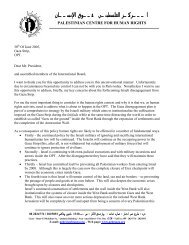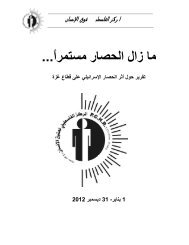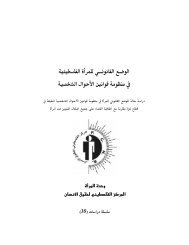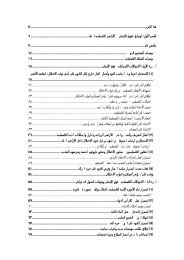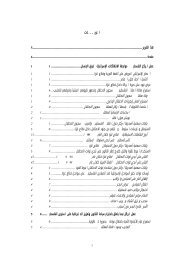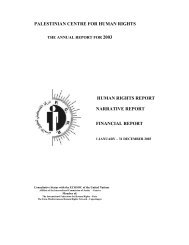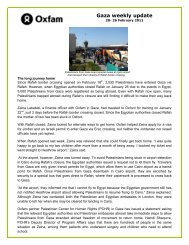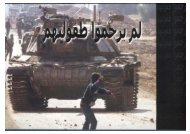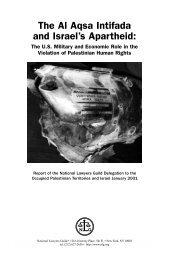Annual Report - Palestinian Center for Human Rights
Annual Report - Palestinian Center for Human Rights
Annual Report - Palestinian Center for Human Rights
You also want an ePaper? Increase the reach of your titles
YUMPU automatically turns print PDFs into web optimized ePapers that Google loves.
Torture and Ill-Treatment of <strong>Palestinian</strong> Detainees<br />
By the end of 2005, at least 9,000 <strong>Palestinian</strong>s, including about 300 children and 200<br />
women, were still in Israeli custody in detention facilities throughout Israel and in<br />
settlements and other military bases in the OPT. Most arrests have taken place during<br />
house raids, especially in the West Bank, and Israeli incursions into <strong>Palestinian</strong> towns,<br />
villages and refugee camps throughout the West Bank and Gaza Strip. Hundreds of<br />
<strong>Palestinian</strong>s were also arrested at Israeli military checkpoints and roadblocks erected<br />
on roads and at entrances to <strong>Palestinian</strong> communities; at border crossings with Egypt<br />
and Jordan; and at crossings into Israel or inside Israel. In the last quarter of 2005,<br />
IOF carried out massive arrest campaigns in the West Bank. Hundreds of <strong>Palestinian</strong><br />
civilians, especially supporters of Hamas and Islamic Jihad were arrested. The largest<br />
of these arrest campaigns took place at the end of September, when IOF arrested at<br />
least 300 <strong>Palestinian</strong> civilians, including religious, political, academic, media figures;<br />
members of university student councils, and candidates <strong>for</strong> the third stage of the local<br />
council elections, which were held on 29 September 2005.<br />
IOF have transferred most of these prisoners out of the OPT to jails and detention<br />
centers inside Israel in violation of the Fourth Geneva Convention. Article 76 of the<br />
Convention provides that “protected persons accused of offences shall be detained in<br />
the occupied country, and if convicted they shall serve their sentences therein.”<br />
Detention conditions <strong>for</strong> <strong>Palestinian</strong>s in Israeli custody continue to violate the<br />
fundamental rights of detainees. <strong>Palestinian</strong> prisoners have reported poor ventilation,<br />
overcrowding, lack of adequate sanitation facilities, poor food and water supplies and<br />
denial of appropriate medical care. IOF <strong>for</strong>ces have also continued to deny or delay<br />
access to legal counsel and relatives, in violation of the minimum standard rules <strong>for</strong><br />
the treatment of prisoners.<br />
The detention conditions <strong>for</strong> <strong>Palestinian</strong>s in Israeli custody are expected to further<br />
deteriorate in light of the serious developments that took place in 2005, especially<br />
with regard to 600 <strong>Palestinian</strong> prisoners from the Gaza Strip. In September 2005, IOF<br />
started to file bills of indictment against a number of <strong>Palestinian</strong> detainees from the<br />
Gaza Strip, who had been arrested in the previous two months, be<strong>for</strong>e Ber al-Saba<br />
(Beer Sheva) Court, inside Israel after they had closed the military court at the Beit<br />
Hanoun Checkpoint (Erez). This new measure coincides with the implementation of<br />
the unilateral Israeli "Disengagement Plan," and strongly indicates that IOF will<br />
continue to arrest <strong>Palestinian</strong>s from the Gaza Strip and bring them to Israeli courts. 31<br />
In another attempt to overcome international legal standards in order to justify<br />
continued detention of <strong>Palestinian</strong> prisoners, Israel invented the concept of the "illegal<br />
combatant" to describe <strong>Palestinian</strong> prisoners who are in fact civilians, entitled to<br />
protection under the Fourth Geneva Convention, and consequently justify their<br />
detention in accordance with a special law called "Illegal Combatants" issued in<br />
2002. According to this law, the IOF Chief of Staff has the authority to issue an arrest<br />
warrant against a person if there is a basis to assume that such person is "an illegal<br />
combatant".<br />
31 See PCHR's press release on 11 September 2005.<br />
42




